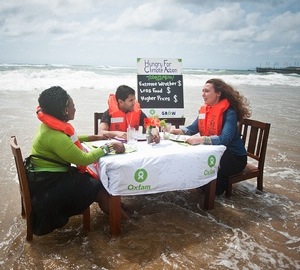In overtime, climate negotiators fall short of the end zone but gain a few yards

Negotiators from more than 190 countries head home after two weeks of talks toward a new accord to curb carbon emissions.
The final deal extends the expiring Kyoto treaty and levels the playing field for the US, but triggers no immediate action.
A condensed diary from Week Two of the Durban conference:
Sun: There’s a glimmer of hope when word circulates that China might consider some kind of binding agreement to reduce carbon emissions.
Tue: UN Secretary General Ban Ki Moon says “The world cannot accept ‘No’ for an answer in Durban. Negotiators continue to provide “No” for an answer. Richard Harris reports for NPR that attaining the soft goal of stopping warming at 2 degrees Celsius (3.6 F) is “proving to be a stretch” with the current voluntary emissions targets.
Wed: Progress toward a Green Climate Fund for developing countries, bankrolled by the largest industrial economies — but not much headway toward a broader deal to reduce emissions. Chief US negotiator denies that Washington is the roadblock, saying instead that the US has been “trying to drag this process into the 21st century.” That’s in part, code for an agreement that treats the US and China equally (China is now the top global emitter of greenhouse gases, though the US still produces more on a per-capita basis).
Fri: Nations seem to be rallying around an 11th-hour effort toward a process that would yield a all-inclusive emissions-cutting deal by 2015. Confusion reigns as a phony version of the draft circulates.
Sat: Talks stretch into overtime in the hope of salvaging some kind of deal, supported by Europe but with no assurance the world’s biggest emitters will go along. A draft emerges of a treaty that appears to be non-binding and doesn’t meet the timetable sought by the EU and others.
Sun: At about 3:30 a.m. on the second day of extra innings, and even after many representatives had left the conference, the #COP17 Twitter stream lights up with “history being made;” an agreement emerges that would lead to “a Protocol, legal instrument or agreed outcome with legal force…” Observers can’t quite tell what that means, but it’s adopted.
As Richard Black wrote for the BBC after the final all-nighter:
“Not a protocol, not a convention, not a mandate; and I’ll place a small bet that phrases like ‘waiting on the Durban Platform’ will gain a lot of currency over the next four years at least.”
NGO’s that had been closely monitoring the talks registered immediate disappointment. The Union of Concerned Scientists’ chief strategist wrote that, “While governments avoided disaster in Durban, they by no means responded adequately to the mounting threat of climate change”
The food security advocacy group, Oxfam, issued a statement that seemed to summarize Durban succinctly:
“Negotiators at the UN climate talks have narrowly avoided a collapse, agreeing to the bare minimum deal possible. The plan gets the Green Climate Fund up and running without any sources of funding, preserves a narrow pathway to avoid 4 degrees of warming and gets a second commitment period of the Kyoto Protocol without key members.”
Yikes. Not exactly a howling success but not the complete collapse of the UN process, either, as some had predicted. What it all means will be sifted and sorted in the days to come but it appears that what was accomplished in Durban was barely enough to save face, not enough to claim a meaningful victory against global warming and its consequences.
